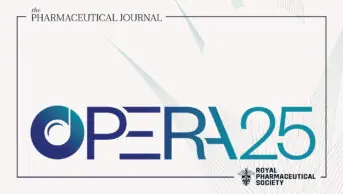
THE PHARMACEUTICAL JOURNAL
Since completing her PhD in 2020, Qonita Anjani has become a figure to watch in the development of innovative drug delivery systems. Her research has focused on microneedle patches and long-acting implant technologies in disease areas such as tuberculosis, HIV, diabetes, skin regeneration and schizophrenia. She primarily works on translating transdermal technology into clinical applications, which involves collaborating with industry to scale up manufacturing and address regulatory challenges to accelerate clinical translation. Her work in tuberculosis treatment has enhanced consistent treatment in resource-limited settings and helped tackle one of the world’s deadliest infectious diseases.
Qonita’s interest in alternative drug delivery was sparked by her family’s experience. Her mother used to find it difficult to swallow tablets or capsules and has a fear of needles. Consequently, she tended to crush any medication to dissolve in water, which is not appropriate for all medicines.
“The focus of my research is the microneedle patch,” she said. “It is a platform that has tiny needles on the surface. This technology is minimally invasive and blood-free and painless. If you touch the surface of the patch, it feels like a cat’s tongue. It has a rough surface, but it will not cause any pain.”
The microneedles create microchannels in the skin, allowing the compound applied to the tip of the microneedles to penetrate the skin and enter the circulatory system. Microneedle patches enhance drug bioavailability and enable precise, controlled release, overcoming challenges related to drug stability and delivery, as well as increasing treatment adherence. Microneedles have been successful in delivering low doses, but Qonita’s focus now is on delivering high-dose compounds, such as antibiotics, antiparasitics and antivirals. Microneedle technology has the potential to transform clinical practice worldwide. For example, microneedle vaccine patches promise to enhance the effectiveness of mass immunisation campaigns, particularly in countries with limited healthcare infrastructure.
Hopefully in the near future this technology will allow patients to reduce the frequency of hospital visits
“As moving care for patients into homes is becoming a priority now, hopefully in the near future this technology will allow patients to reduce the frequency of hospital visits and, consequently, the burden on the healthcare system.”
Qonita’s collaborations with leading pharmaceutical companies, including GSK, Merck, Janssen, TSRL and LTS Lohmann, are vital to the real-world impact her research is having on patients. Working with these companies allows the efficient scale-up and clinical translation of microneedle technology, moving her work from the laboratory to the patients who need it.
Environmental sustainability is also an important consideration in Qonita’s research. Vaccination and disease treatment equipment, such as syringes and needles, generate significant waste of non-recyclable and non-biodegradable materials. Qonita has designed her microneedle systems to use biodegradable materials, thus reducing waste and the impact on the environment.
Qonita has taken an innovative approach to communicating her research to a wider audience. She developed a YouTube video to explain the application of microneedle patches in tuberculosis treatment and commissioned comic-book style illustrations for a recent review article.
Educating and inspiring the future generation of pharmacists is important to Qonita, especially those in her country of origin, Indonesia, and other developing nations. In 2024, Qonita was recognised by Stanford University and Elsevier as a ‘Top 2%’ scientist according to publications/citations in 2023. This award led to invitations to speak at international conferences as a keynote speaker and active involvement in the international scientific community. She is proud to be a visible example of women in STEM and passes on her expertise by leading sessions on research and publication.
“I’m pursuing fellowships to get my own funding to build my own independent groups,” Qonita said. “If I get funding, then I can continue to help anyone that is interested in this field or anyone, even out of my field, who wants to work together in research.”
Panel comments
“This candidate stands out for their exceptional commitment to research innovation in drug delivery, has demonstrated substantial impact over the past five years, with work that is clearly translatable to patient care and disease management.”
“Their work exemplifies both scientific excellence and meaningful public engagement, making them a particularly strong contender.”
“An exceptionally strong researcher at this early career stage.”
“H-index of 28 is indeed very impressive achievement for someone who completed their PhD just five years ago. A m-quotient of 5.6 is extraordinary.”
Selected publications
- Lyophilised reservoirs in combination with hydrogel-forming microarray patches for transdermal delivery of isoniazid and pyridoxine hydrochloride;
- Hydrogel-forming microarray patches for labetalol hydrochloride delivery;
- Delivery of islatravir via high drug-load, long-acting microarray patches for the prevention or treatment of human immunodeficiency virus;
- Primaquine and chloroquine nano-sized solid dispersion-loaded dissolving microarray patches for the improved treatment of malaria caused by Plasmodium vivax;
- Double-layer dissolving microneedles for delivery of mesenchymal stem cell Secretome: Formulation, characterisation and skin irritation study;
- Microarray patches for managing infections at a global scale.
You may also be interested in

OPERA 2025: Smita Salunke

OPERA 2025: Jennifer Stevenson
